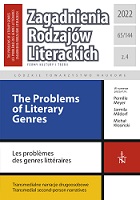Making Unstrange: Theory and Second-Person Fiction
Making Unstrange: Theory and Second-Person Fiction
Author(s): Joshua ParkerSubject(s): Semiotics / Semiology, Psychoanalysis, Phenomenology, Theory of Literature, Sociology of Literature
Published by: Łódzkie Towarzystwo Naukowe
Keywords: second-person fiction; psychoanalytic theory; literary semiotics; deictic theory; phenomenology;
Summary/Abstract: Russian Formalism’s suggestion that artistic literature makes the familiar strange finds echoes in today’s theories of “unnatural narrative.” “Naturalization” of seemingly strange texts understands uncanny literary effects as based on qualities of “natural” spoken language. Sifting through structuralist, pre-structuralist, and psychoanalytic musings on second-person fiction or similar effects in interpersonal relations, all largely neglected as studies of second-person narrative were popularized among theorists and critics over the past thirty years, this article theorizes readers’ ‘realization’ or ‘virtualization’ of second-person address, narratorial apostrophe, and second-person protagonists. One reason we have no agreed-upon, comprehensive chart explaining second-person address’s variable effects on various readers (with an appreciative nod to Sandrine Sorlin), is not that no such chart is impossible — but simply that any such chart would be complex. Such projects might be nuanced by earlier thoughts focused on more general theories of psychology, phenomonology, and human exchanges. This requires more reflection on the fuctions, formulations, and effects of second-person narrative, but also more thinking about its affects.
Journal: Zagadnienia Rodzajów Literackich
- Issue Year: 65/2022
- Issue No: 4
- Page Range: 51-67
- Page Count: 17
- Language: English

